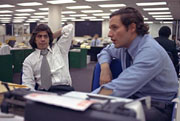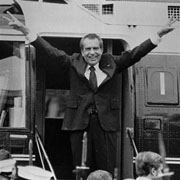VOA慢速英语2011--American History: Nixon Resigns Over Watergate
搜索关注在线英语听力室公众号:tingroom,领取免费英语资料大礼包。
(单词翻译)
THE MAKING OF A NATION - American History: Nixon Resigns Over Watergate
STEVE EMBER: Welcome to THE MAKING OF A NATION -- American history in VOA Special English. I’m Steve Ember.
This week in our series, we conclude the story of the thirty-seventh president of the United States, Richard Nixon.
(MUSIC)
Richard Nixon's first term ended with the hope for a complete American withdrawal1 from the war in Vietnam. Yet Americans were still angry about the war and its economic effects on life at home. Inflation and unemployment were both high.
Some political observers thought Nixon would not win a second term. Nixon, however, was sure the American people would support him.
He did not actively2 campaign in the state primary elections leading up to the Republican nominating convention. He focused much of his attention on foreign policy -- including his historic trip to China in February nineteen seventy-two. In May he traveled to Austria, the Soviet3 Union, Iran and Poland. In Moscow, he signed the first Strategic Arms Limitation Treaty, or SALT, with the Soviets4.
 |
| Reporters Bob Woodward, right, and Carl Bernstein in the Washington Post newsroom on May 7, 1973. Their reporting of the Watergate case won them a Pulitzer Prize. |
But back in Washington, something happened. It was a small incident, but one that would have a huge effect.
(MUSIC)
On June seventeenth, nineteen seventy-two, five men wearing surgical5 gloves broke into the headquarters of the Democratic Party. The Democratic National Committee offices were located in one of the buildings in a complex called Watergate. Police caught the burglars and, at the time, the incident did not seem very important.
But the men carried papers that linked them to top officials in the Nixon White House. The question was: Did the president know what was going on? Nixon denied any wrongdoing.
In time, the Watergate break-in would lead to a congressional investigation6.
(MUSIC)
But, in the summer of nineteen seventy-two, attention focused on the presidential nominating conventions. Democrats7 met in Miami Beach, Florida, and chose George McGovern, a senator from South Dakota, as their candidate for president.
The Republicans also met in Miami Beach and, as expected, nominated Richard Nixon for a second term.
McGovern, a liberal, attacked Nixon for his policies on Vietnam. However, Nixon easily won the nineteen seventy-two election. He defeated McGovern, carrying forty-nine of the fifty states.
But the shadow of Watergate would not go away.
Two young reporters for the Washington Post, Bob Woodward and Carl Bernstein, had been following the story since the break-in. In early nineteen seventy-three, they found evidence that linked the break-in to White House officials. The evidence also showed that these officials tried to use government agencies to hide the connection.
The burglars had been financed with money connected to the Committee to Re-Elect the President.
Pressure grew for a full investigation. In April, President Nixon ordered the Justice Department to carry it out. Attorney General Elliot Richardson appointed law professor Archibald Cox as a special prosecutor8 to lead the investigation.
SENATOR SAM ERVIN (WATERGATE COMMITTEE CHAIRMAN)): “The committee will come to order."
In May, a special Senate committee began its own investigation. A former White House lawyer, John Dean, provided the major evidence.
JOHN DEAN: “It is my honest belief that, while the president was involved, he did not realize, or appreciate at any time, the implications of his involvement. And I think that, when the facts come out, I hope the president is forgiven.”
By July, the public learned that President Nixon had made tape recordings10 of some of his discussions and telephone calls. The Senate committee asked him for some of the tapes. Nixon refused. He said the president of the United States has a Constitutional right to keep such records private.
A federal judge, John Sirica, ordered the president to surrender the tapes. Lawyers for the president took the case to the Supreme11 Court. The high court supported Sirica's decision.
After that, pressure increased for Nixon to cooperate. In October, he offered to provide written transcripts12 of parts of the recordings. Archibald Cox, the special prosecutor, rejected the offer. So Nixon ordered Attorney General Richardson to dismiss him. Richardson -- the nation's top law enforcement officer -- refused. Instead, he resigned, as did his deputy, William Ruckelshaus, when Nixon ordered him to fire Cox.
ABC NEWS REPORTER JERRY LANDAY: “The Watergate drama has taken a half-year to unfold. The president’s unique actions in firing two popular and respected members of the Executive Branch, and forcing a third to quit, took less than eight hours. The impact of all this, clearly colossal13, and yet to be measured.”
Jerry Landay, reporting for ABC News.
(MUSIC)
The incident happened on a Saturday night and became known as the "Saturday Night Massacre14."
Nixon then had acting15 Attorney General Robert Bork dismiss Cox, and the president eliminated the office of special prosecutor. He gave the Justice Department the responsibility of continuing the investigation.
President Nixon had another political problem, in addition to Watergate. In late nineteen seventy-three, his vice16 president, Spiro Agnew, was forced to resign. A court had found Agnew guilty of violating tax laws.
President Nixon asked Gerald Ford17 to become the new vice president. Ford was a longtime member of Congress from Michigan.
By that time, some members of Congress were talking about trying to remove Nixon from office. Was the president covering up important evidence in the Watergate case? Was he, in fact, guilty of crimes?
In April nineteen seventy-four, Nixon surrendered some of the recordings of conversations in his office. However, three important ones were missing. The Nixon administration tried to explain, saying the tape machine had failed to record two of those conversations. The third recording9, it said, had been erased18 accidentally. This became known as the famous "eighteen-minute gap."
Many Americans did not believe these explanations.
Two months later, the Supreme Court ruled that a president cannot hold back evidence in a criminal case. It said there is no presidential right of privacy in such a case.
Congress moved ahead with efforts to bring charges against the president.
REPRESENTATIVE OGDEN REID: "Congress has no alternative now but to institute impeachment20 proceedings21."
(MUSIC)
In July nineteen seventy-four, a committee in the House of Representatives proposed to impeach19 Nixon. That is, put the president on trial in the Senate. If Nixon were found guilty of crimes connected to the Watergate case, he would be removed from office.
Finally, Nixon surrendered the last of the documents sought by congressional investigators22. These documents appeared to provide proof that the president had ordered a cover-up of evidence in the Watergate burglary.
(MUSIC)
Every president promises to protect and defend the Constitution. The congressional investigation showed that Nixon had repeatedly misused23 government agencies in an effort to hide wrongdoing and punish his critics. The hearings also showed that he had tried to block the investigation.
 |
| Richard Nixon says goodbye to staff members outside the White House on August 9, 1974, after resigning |
On August eighth, nineteen seventy-four, Richard Nixon spoke24 to the nation. His long struggle to remain in office was over.
RICHARD NIXON: "Throughout the long and difficult period of Watergate, I have felt it was my duty to persevere25, to make every possible effort to complete the term of office to which you elected me. In the past few days, however, it has become evident to me that I no longer have a strong enough political base in the Congress to justify26 continuing that effort. Therefore, I shall resign the presidency27 effective at noon tomorrow."
(MUSIC)
By resigning, Nixon avoided impeachment and possible imprisonment28. Never before had an American president resigned. On August ninth, Nixon's vice president, Gerald Ford, was sworn-in as the nation's thirty-eighth president.
Soon after becoming president, Gerald Ford made a surprise announcement.
GERALD FORD: “I deeply believe in equal justice for all Americans, whatever their station or former station. But it is not the ultimate fate of Richard Nixon that most concerns me, though surely it deeply troubles every decent and every compassionate29 person. My concern is the immediate30 future of this great country.”
(MUSIC)
He pardoned Richard Nixon. Many Americans criticized Ford for doing this. But the new president believed he had good reason.
Ford wanted to deal with the other problems facing the nation. He did not want Watergate to go on and on. But the investigation did go on. A number of officials in the Nixon administration went to prison.
The effects of Watergate on public opinion and public policy would be felt for years to come.
For example, Congress passed laws designed to prevent an administration from using its power to punish opponents. Nixon's abuses also led Congress to order government agencies to provide more information about their intelligence gathering31 activities.
Nixon's actions violated the basic trust between the American public and their elected officials. It led to more aggressive reporting by a new generation of journalists hoping to follow in the footsteps of Woodward and Bernstein. Their coverage32 of Watergate won a Pulitzer Prize -- one of journalism's top awards -- and led to a movie based on their book "All the President's Men." It starred Robert Redford as Bob Woodward and Dustin Hoffman as Carl Bernstein. Jason Robards played Washington Post Executive Editor Ben Bradlee.
MANAGING EDITOR HOWARD SIMONS (MARTIN BALSAM): "But do any of them have an axe33?"
BOB WOODWARD (ROBERT REDFORD): "No."
HOWARD SIMONS: "Personal, political, sexual, is there anything at all on Mitchell?"
BOB WOODWARD: "No."
HOWARD SIMONS: "Then can we use their names?"
CARL BERNSTEIN (DUSTIN HOFFMAN): "No."
BEN BRADLEE (JASON ROBARDS): "When is somebody going to go on the record in this story? You guys are about to write a story that says the former attorney general, the highest-ranking law enforcement officer in this country, is a crook34! Just be sure you're right."
(MUSIC)
The presidency of Nixon’s successor, Gerald Ford, will be our story next week.
You can find our series online with transcripts, MP3s, podcasts and pictures at voanews.cn. You can also follow us on Facebook and Twitter at VOA Learning English. I’m Steve Ember, inviting35 you to join us again next week for THE MAKING OF A NATION -- American history in VOA Special English.
___
Contributing: Jerilyn Watson
This was program #218. For earlier programs, type "Making of a Nation" in quotation36 marks in the search box at the top of the page.
 收听单词发音
收听单词发音 




